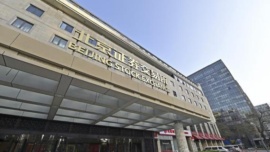Portugal’s minister of internal administration, Eduardo Cabrita, highlighted on Tuesday the advances he considered to have been achieved during the six-month Portuguese presidency of the Council of the European Union concerning migration and its integrated management.
Speaking at the press conference after the last Council of EU home ministers which he chaired in Luxembourg, Cabrita highlighted that the meeting included a debate focused on the integrated management of migration, with the participation of the International Organisation for Migration (IOM) and the Office of the United Nations High Commissioner for Refugees (UNHCR), and an update on the “progress made on the asylum and migration agenda”, even though it has not yet been possible to reach a compromise among the 27 on the New Pact for Migration and Asylum proposed by the European Commission.
Regarding the debate, held over lunch with IOM Director-General António Vitorino and UNHCR Deputy High Commissioner Gillian Triggs, the minister pointed out that it was possible to “move forward in what is one of the main commitments of the European Commission, but also one of the main areas of commitment of the Portuguese presidency: to deepen a strategy to promote integrated management of migrations as a normal phenomenon of life in Europe, where migrations are positive for Europeans.
“We want to promote a dynamic relationship between Europe and Africa, our neighbouring continent”, he stressed, adding that, “for this, developments are important both in a common border management dimension and in the promotion of legal migration mechanisms”.
In this regard, he continued, “the Portuguese presidency has noted as a significant development that the approval of the “blue card” directive (legislation aimed at attracting highly qualified workers), which had been blocked for three years, has been concluded,” with the debate being initiated during the German presidency and concluded during the Portuguese presidency.
Also in this area, he added, Portugal “greatly values” the presentation next Friday of the new partnership programme for the promotion of attracting talent to the EU, which Commissioner for Internal Affairs Ylva Johansson will promote, particularly welcomed by Cabrita for the “work side by side” developed over recent months.
Although it was not possible to reach an agreement by the 27 on the Migration Pact, Cabrita considered that much progress was made during the six months, particularly at the technical level, a commitment assumed by the Portuguese presidency given the complexity of the legislative package and the great differences between member states on migration policy.
“In terms of asylum and migration, the strategy of the Portuguese presidency was to undertake all the technical work and, at the technical level, I would say that at this moment, all the legislative instruments are analysed in their first reading. We have identified the issues that need political evaluation. We, therefore, regard as very important the political agreement in principle reached today on the EASO regulation”, the European Asylum Support Office, he said.
Looking further back, the minister said that there had also been “very significant progress in affirming the external dimension of migration”, recalling the celebration, during the Portuguese presidency, of the first “Jumbo” Council (joint meeting of EU foreign and interior ministers) in the last six years devoted to the external dimension of migration, as well as the EU-Africa ministerial conference held in May in Lisbon on managing migratory flows, “which was attended by all the southern states, from Egypt to Senegal”.
Cabrita wished the European Commission and the upcoming Slovenian presidency well, especially concerning the important issue of migration, which, he recalled, would even be part of the last summit of EU heads of state and government this semester held on 24 and 25 June in Brussels.






















